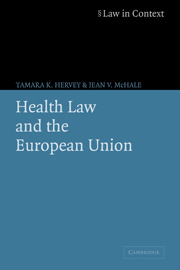Book contents
- Frontmatter
- Contents
- Acknowledgements
- Table of abbreviations
- Table of conventions and treaties
- Table of EU legislation
- Table of national provisions
- Table of cases
- Part One
- Part Two
- 4 Access to health care services
- 5 Data protection and health information privacy
- 6 Regulation of health care professionals
- 7 The regulation of clinical research
- 8 Regulating pharmaceuticals: risk, choice and compensation
- 9 Public health law
- Part Three
- Bibliography
- Index
4 - Access to health care services
Published online by Cambridge University Press: 10 December 2009
- Frontmatter
- Contents
- Acknowledgements
- Table of abbreviations
- Table of conventions and treaties
- Table of EU legislation
- Table of national provisions
- Table of cases
- Part One
- Part Two
- 4 Access to health care services
- 5 Data protection and health information privacy
- 6 Regulation of health care professionals
- 7 The regulation of clinical research
- 8 Regulating pharmaceuticals: risk, choice and compensation
- 9 Public health law
- Part Three
- Bibliography
- Index
Summary
Introduction
In this chapter and the next, we consider two of the areas which would, in standard health law jurisprudence, be frequently considered as falling within the boundaries of “patient rights” (for instance, to confidentiality, protection of personal autonomy and dignity, consent to treatment, and so on) and the right to access health care services. As we noted in chapter 1, while it is the case that the law of the EU may, in some respects, affect those issues which are to be commonly found in health law textbooks, such issues are not neatly categorised under the “headings” of health law. Nonetheless, as we have seen already, there are certain areas in which the EU appears to be having an impact on health law in the Member States. One such area is that of access to health care services, as illustrated by the Diane Blood and Yvonne Watts stories with which we began this book.
In the case of access to health care services, the subject of this chapter, in many respects, the use of rights language in this context can be seen as something of a misnomer. A claim by an individual of a “right” to access health care services is wholly dependent upon the particular service being available. Where services are state funded, this depends on the resources available. Competing rights claims may arise. This is probably why there has been notable judicial unwillingness at national level to become embroiled in disputes concerning resource allocation.
- Type
- Chapter
- Information
- Health Law and the European Union , pp. 109 - 158Publisher: Cambridge University PressPrint publication year: 2004



